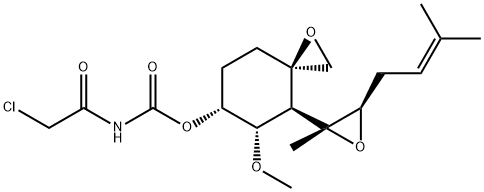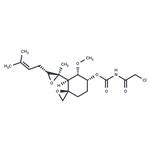Description
TNP-470 is a synthetic analog of fumagillin that inhibits angiogenesis. It irreversibly inactivates methionine aminopeptidase-2 (MetAP2; IC
50 = 2 μM), blocking endothelial cell proliferation
in vitro and angiogenesis
in vivo. It is without effect on MetAP1. TNP-470 has therapeutic potential in cancer and microsporidiosis.
Uses
TNP-470 is a synthetic analog of fumagillin that inhibits angiogenesis. It irreversibly inactivates methionine aminopeptidase-2 (MetAP2; IC50 = 2 μM), blocking endothelial cell proliferation in vitro and angiogenesis in vivo. It is without effect on MetAP1. TNP-470 has therapeutic potential in cancer and microsporidiosis.
Uses
TNP-470 is a synthetic analog of Fumagillin (F862650); a compound isolated from the fungus Aspergillus fumigatus. Fumagillin is an antimicrobial agent used in the treatment of microsporidiosis and shows promise as both an anti-infective and antiangiogenic agent.
Definition
ChEBI: A carbamate ester that is fumagillol in which the hydroxy group has been converted to the corresponding N-(chloroacetyl)carbamate derivative.
General Description
TNP-470 is a synthetic analogue of fumagillin. It is a natural product of Aspergillus fumigatus. TNP-470 serves as an angiogenesis inhibitor.
Biological Activity
Analog of Fumagillin ((2E,4E,6E,8E)-Mono[(3R,4S,5S,6R)-5-methoxy-4-[(2R,3R)-2 -methyl-3-(3-methyl-2-butenyl)oxiranyl]-1-oxaspiro[2.5] oct-6-yl] 2,4,6,8-decatetraenedioic acid ester) that displays potent antiangiogenic activity in vitro and in vivo . Inhibits methionine aminopeptidase type II (MetAP2).
Biochem/physiol Actions
TNP-470 is a methionine aminopeptidase-2 (MetAP-2) inhibitor, selective for MetAP-2 over MetAP11. TNP-470 is an antiangiogenic.
in vitro
antitumor activity of tnp-470 was evaluated in eight human cultured cell lines derived from choriocarcinoma; ovarian cancer; tyk and nakajima; and uterine endometrial cancer. results showed that after 7-day culture with tnp-470, in medium at the concentration of 10 to 10-2 μg/ml, the inhibition of growth was observed in all of the eight cell lines. the half inhibitory concentration of choriocarcinoma cell lines was at an extremely low level compared to that of e uterine endometrial cancer and pithelial ovarian cancer [1].
in vivo
the anti-tumor effect of tnp-470 was studied using nude mice with tumors of gch-1(m), nuc-1, or nakajima cells. when the size of the transplanted tumor reached 100–200 mm3, 3, 10, or 30 mg/kg of tnp-470 was injected every other day. it was found that the inhibitory effect of tnp-470 was obtained by the administration of 10 and 30 mg/kg in gch-1(m) and nuc-1 cells, respectively, while in nakajima cells there was no significant effect. in addition, in nude mice treated with 30 mg/kg of tnp-470, lung metastasis of gch-1(m) cells was greatly inhibited both in the number and the size of tumor nodules, suggesting that the capillary growth in the originally developed tumor was also reduced [1].
References
[1] t. yanase, m. tamura, k. rujita, et al. inhibitory effect of angiogenesis inhibitor tnp-470 on tumor growth and metastasis of human cell lines in vitro and in vivo. cancer research 53(11), 2566-2570 (1993).
[2] c j logothetis et al. phase i trial of the angiogenesis inhibitor tnp-470 for progressive androgen-independent prostate cancer. clinical cancer research 7(5):1198-203.


